ExxonMobil's Corporate Social Responsibility
VerifiedAdded on 2023/06/15
|17
|4603
|384
AI Summary
This report evaluates ExxonMobil's CSR activities and their impact on Nigeria's government and civil society. It explores the company's sustainable water solutions and the interconnectedness among stakeholders. The report also evaluates the Nigerian government's impact on ExxonMobil's water resource development.
Contribute Materials
Your contribution can guide someone’s learning journey. Share your
documents today.
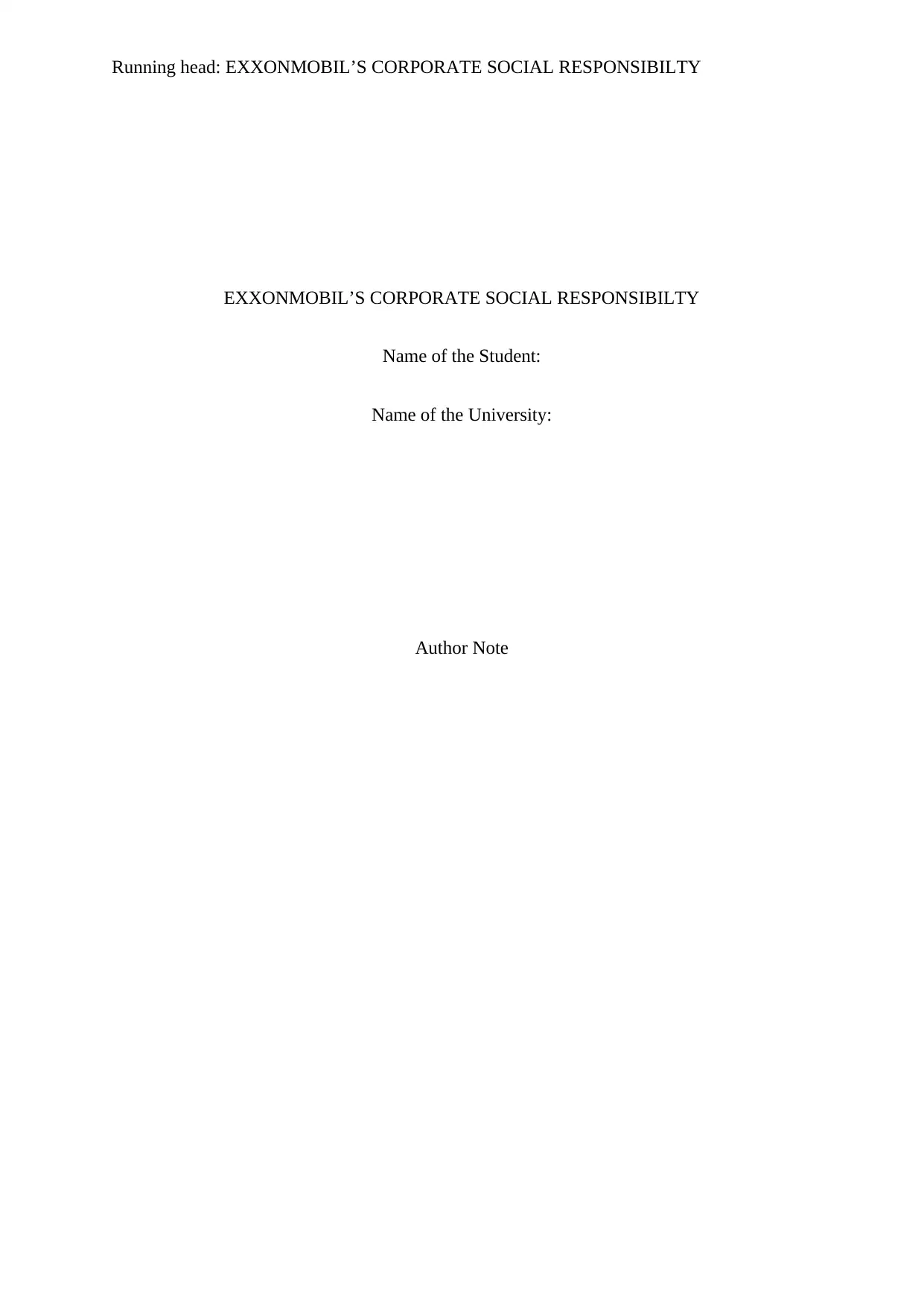
Running head: EXXONMOBIL’S CORPORATE SOCIAL RESPONSIBILTY
EXXONMOBIL’S CORPORATE SOCIAL RESPONSIBILTY
Name of the Student:
Name of the University:
Author Note
EXXONMOBIL’S CORPORATE SOCIAL RESPONSIBILTY
Name of the Student:
Name of the University:
Author Note
Secure Best Marks with AI Grader
Need help grading? Try our AI Grader for instant feedback on your assignments.
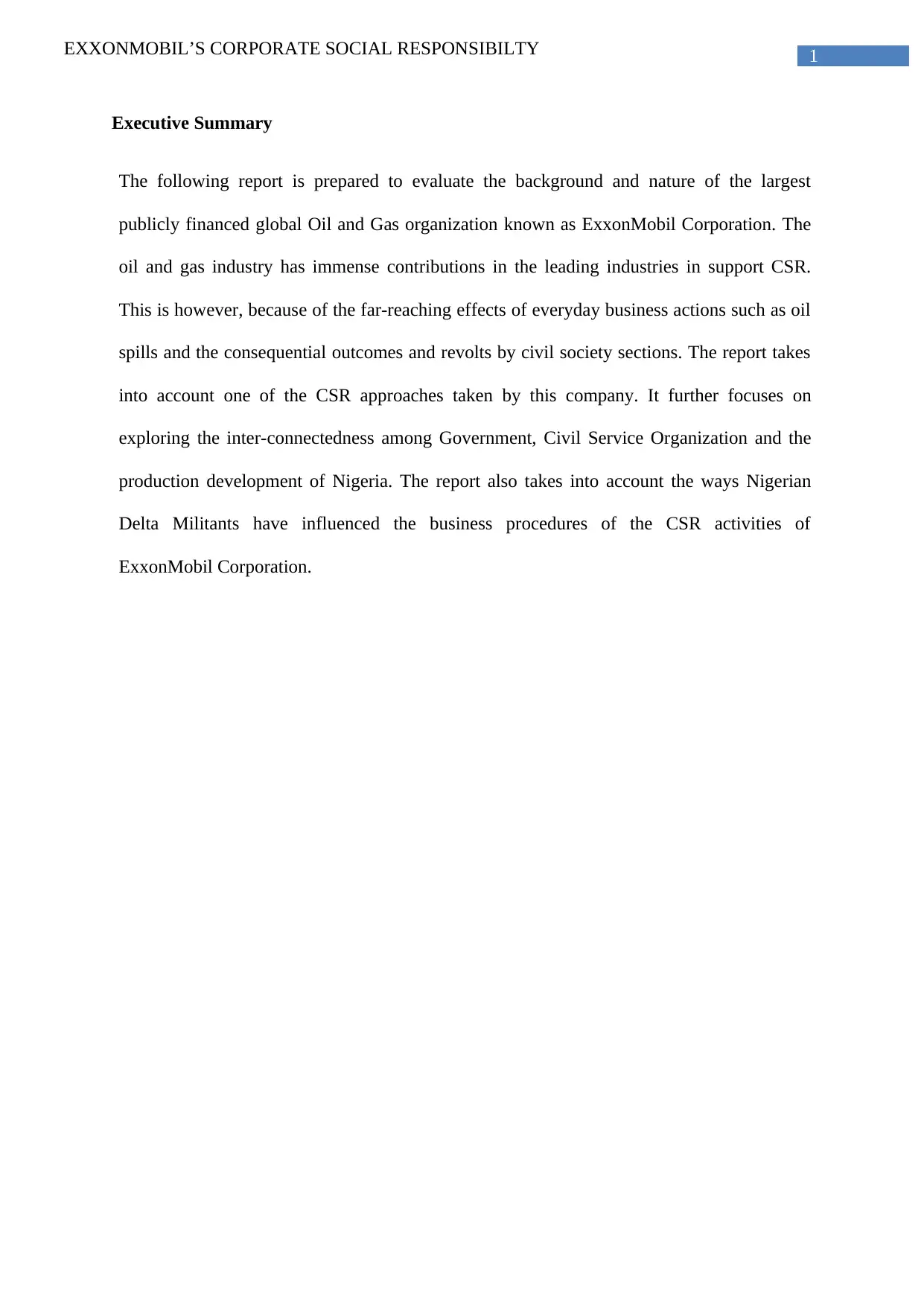
1EXXONMOBIL’S CORPORATE SOCIAL RESPONSIBILTY
Executive Summary
The following report is prepared to evaluate the background and nature of the largest
publicly financed global Oil and Gas organization known as ExxonMobil Corporation. The
oil and gas industry has immense contributions in the leading industries in support CSR.
This is however, because of the far-reaching effects of everyday business actions such as oil
spills and the consequential outcomes and revolts by civil society sections. The report takes
into account one of the CSR approaches taken by this company. It further focuses on
exploring the inter-connectedness among Government, Civil Service Organization and the
production development of Nigeria. The report also takes into account the ways Nigerian
Delta Militants have influenced the business procedures of the CSR activities of
ExxonMobil Corporation.
Executive Summary
The following report is prepared to evaluate the background and nature of the largest
publicly financed global Oil and Gas organization known as ExxonMobil Corporation. The
oil and gas industry has immense contributions in the leading industries in support CSR.
This is however, because of the far-reaching effects of everyday business actions such as oil
spills and the consequential outcomes and revolts by civil society sections. The report takes
into account one of the CSR approaches taken by this company. It further focuses on
exploring the inter-connectedness among Government, Civil Service Organization and the
production development of Nigeria. The report also takes into account the ways Nigerian
Delta Militants have influenced the business procedures of the CSR activities of
ExxonMobil Corporation.
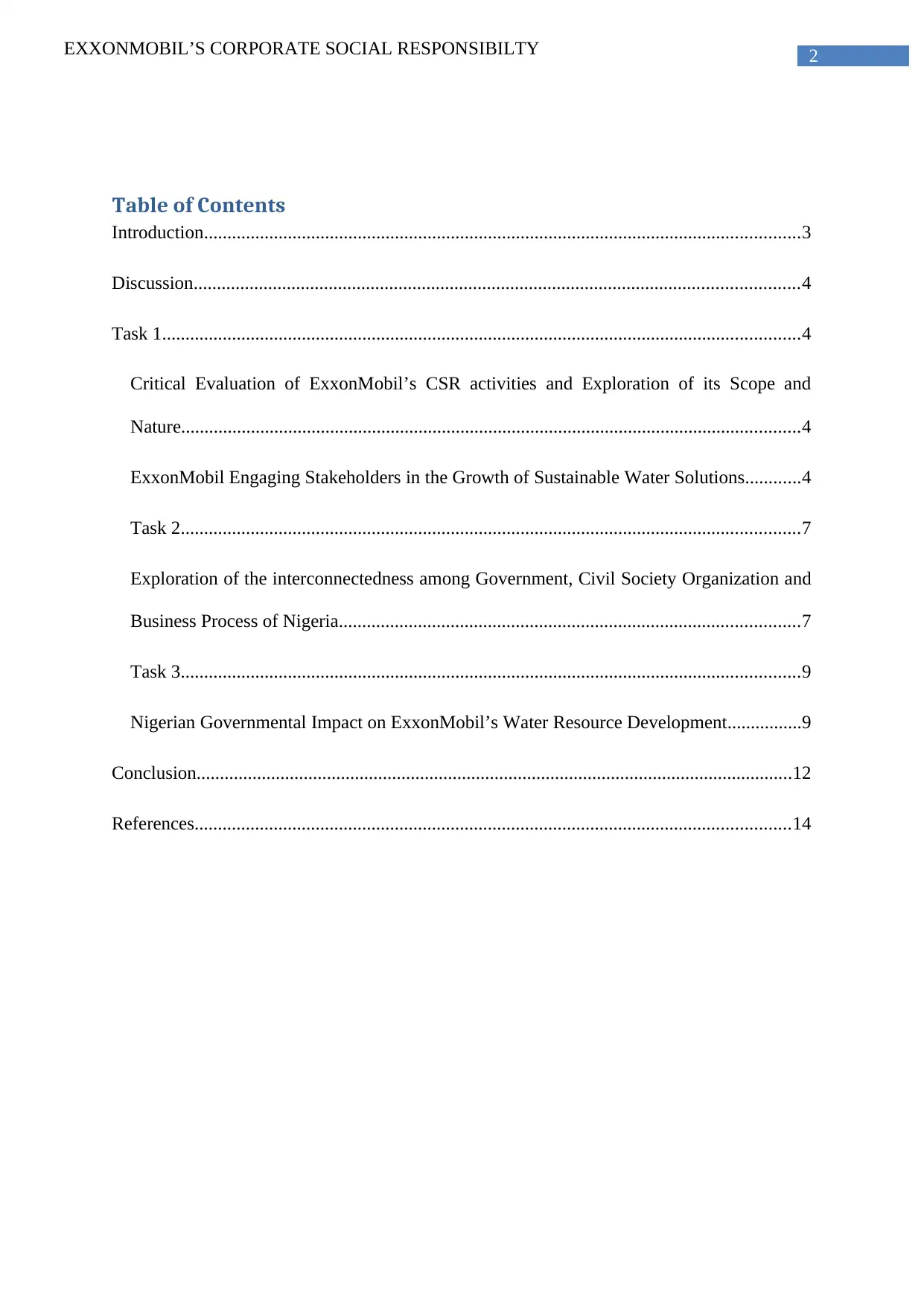
2EXXONMOBIL’S CORPORATE SOCIAL RESPONSIBILTY
Table of Contents
Introduction................................................................................................................................3
Discussion..................................................................................................................................4
Task 1.........................................................................................................................................4
Critical Evaluation of ExxonMobil’s CSR activities and Exploration of its Scope and
Nature.....................................................................................................................................4
ExxonMobil Engaging Stakeholders in the Growth of Sustainable Water Solutions............4
Task 2.....................................................................................................................................7
Exploration of the interconnectedness among Government, Civil Society Organization and
Business Process of Nigeria...................................................................................................7
Task 3.....................................................................................................................................9
Nigerian Governmental Impact on ExxonMobil’s Water Resource Development................9
Conclusion................................................................................................................................12
References................................................................................................................................14
Table of Contents
Introduction................................................................................................................................3
Discussion..................................................................................................................................4
Task 1.........................................................................................................................................4
Critical Evaluation of ExxonMobil’s CSR activities and Exploration of its Scope and
Nature.....................................................................................................................................4
ExxonMobil Engaging Stakeholders in the Growth of Sustainable Water Solutions............4
Task 2.....................................................................................................................................7
Exploration of the interconnectedness among Government, Civil Society Organization and
Business Process of Nigeria...................................................................................................7
Task 3.....................................................................................................................................9
Nigerian Governmental Impact on ExxonMobil’s Water Resource Development................9
Conclusion................................................................................................................................12
References................................................................................................................................14
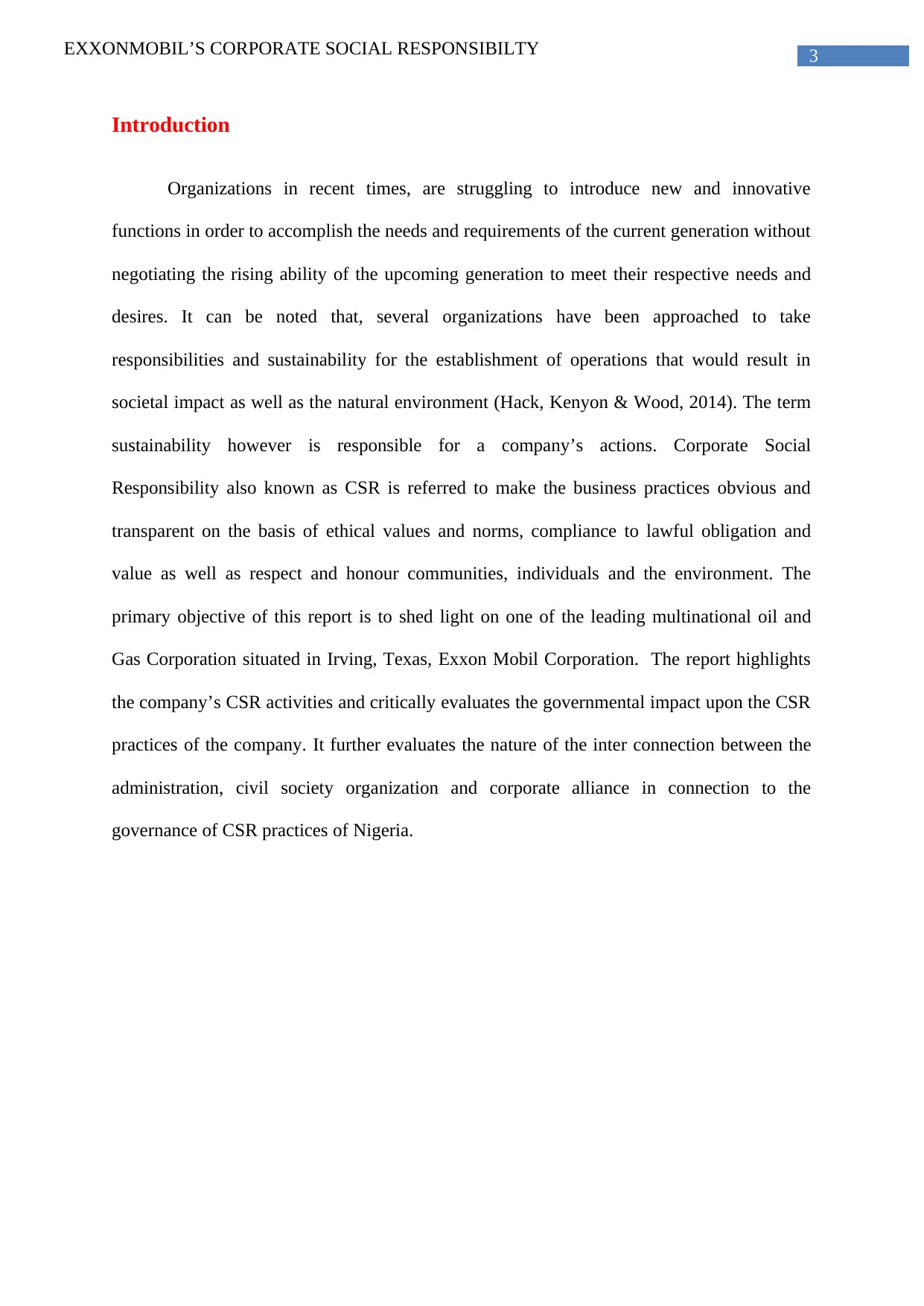
3EXXONMOBIL’S CORPORATE SOCIAL RESPONSIBILTY
Introduction
Organizations in recent times, are struggling to introduce new and innovative
functions in order to accomplish the needs and requirements of the current generation without
negotiating the rising ability of the upcoming generation to meet their respective needs and
desires. It can be noted that, several organizations have been approached to take
responsibilities and sustainability for the establishment of operations that would result in
societal impact as well as the natural environment (Hack, Kenyon & Wood, 2014). The term
sustainability however is responsible for a company’s actions. Corporate Social
Responsibility also known as CSR is referred to make the business practices obvious and
transparent on the basis of ethical values and norms, compliance to lawful obligation and
value as well as respect and honour communities, individuals and the environment. The
primary objective of this report is to shed light on one of the leading multinational oil and
Gas Corporation situated in Irving, Texas, Exxon Mobil Corporation. The report highlights
the company’s CSR activities and critically evaluates the governmental impact upon the CSR
practices of the company. It further evaluates the nature of the inter connection between the
administration, civil society organization and corporate alliance in connection to the
governance of CSR practices of Nigeria.
Introduction
Organizations in recent times, are struggling to introduce new and innovative
functions in order to accomplish the needs and requirements of the current generation without
negotiating the rising ability of the upcoming generation to meet their respective needs and
desires. It can be noted that, several organizations have been approached to take
responsibilities and sustainability for the establishment of operations that would result in
societal impact as well as the natural environment (Hack, Kenyon & Wood, 2014). The term
sustainability however is responsible for a company’s actions. Corporate Social
Responsibility also known as CSR is referred to make the business practices obvious and
transparent on the basis of ethical values and norms, compliance to lawful obligation and
value as well as respect and honour communities, individuals and the environment. The
primary objective of this report is to shed light on one of the leading multinational oil and
Gas Corporation situated in Irving, Texas, Exxon Mobil Corporation. The report highlights
the company’s CSR activities and critically evaluates the governmental impact upon the CSR
practices of the company. It further evaluates the nature of the inter connection between the
administration, civil society organization and corporate alliance in connection to the
governance of CSR practices of Nigeria.
Secure Best Marks with AI Grader
Need help grading? Try our AI Grader for instant feedback on your assignments.
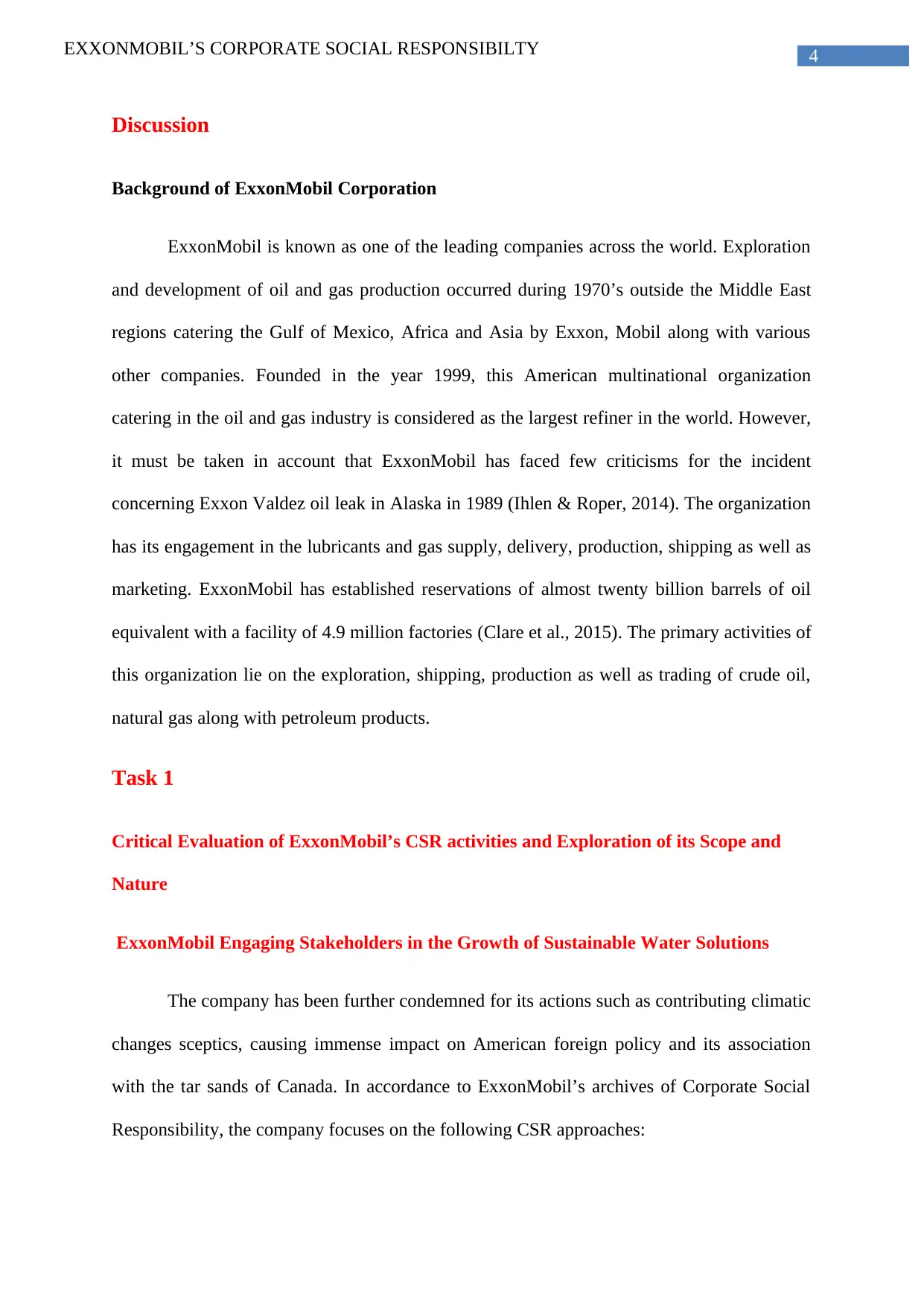
4EXXONMOBIL’S CORPORATE SOCIAL RESPONSIBILTY
Discussion
Background of ExxonMobil Corporation
ExxonMobil is known as one of the leading companies across the world. Exploration
and development of oil and gas production occurred during 1970’s outside the Middle East
regions catering the Gulf of Mexico, Africa and Asia by Exxon, Mobil along with various
other companies. Founded in the year 1999, this American multinational organization
catering in the oil and gas industry is considered as the largest refiner in the world. However,
it must be taken in account that ExxonMobil has faced few criticisms for the incident
concerning Exxon Valdez oil leak in Alaska in 1989 (Ihlen & Roper, 2014). The organization
has its engagement in the lubricants and gas supply, delivery, production, shipping as well as
marketing. ExxonMobil has established reservations of almost twenty billion barrels of oil
equivalent with a facility of 4.9 million factories (Clare et al., 2015). The primary activities of
this organization lie on the exploration, shipping, production as well as trading of crude oil,
natural gas along with petroleum products.
Task 1
Critical Evaluation of ExxonMobil’s CSR activities and Exploration of its Scope and
Nature
ExxonMobil Engaging Stakeholders in the Growth of Sustainable Water Solutions
The company has been further condemned for its actions such as contributing climatic
changes sceptics, causing immense impact on American foreign policy and its association
with the tar sands of Canada. In accordance to ExxonMobil’s archives of Corporate Social
Responsibility, the company focuses on the following CSR approaches:
Discussion
Background of ExxonMobil Corporation
ExxonMobil is known as one of the leading companies across the world. Exploration
and development of oil and gas production occurred during 1970’s outside the Middle East
regions catering the Gulf of Mexico, Africa and Asia by Exxon, Mobil along with various
other companies. Founded in the year 1999, this American multinational organization
catering in the oil and gas industry is considered as the largest refiner in the world. However,
it must be taken in account that ExxonMobil has faced few criticisms for the incident
concerning Exxon Valdez oil leak in Alaska in 1989 (Ihlen & Roper, 2014). The organization
has its engagement in the lubricants and gas supply, delivery, production, shipping as well as
marketing. ExxonMobil has established reservations of almost twenty billion barrels of oil
equivalent with a facility of 4.9 million factories (Clare et al., 2015). The primary activities of
this organization lie on the exploration, shipping, production as well as trading of crude oil,
natural gas along with petroleum products.
Task 1
Critical Evaluation of ExxonMobil’s CSR activities and Exploration of its Scope and
Nature
ExxonMobil Engaging Stakeholders in the Growth of Sustainable Water Solutions
The company has been further condemned for its actions such as contributing climatic
changes sceptics, causing immense impact on American foreign policy and its association
with the tar sands of Canada. In accordance to ExxonMobil’s archives of Corporate Social
Responsibility, the company focuses on the following CSR approaches:
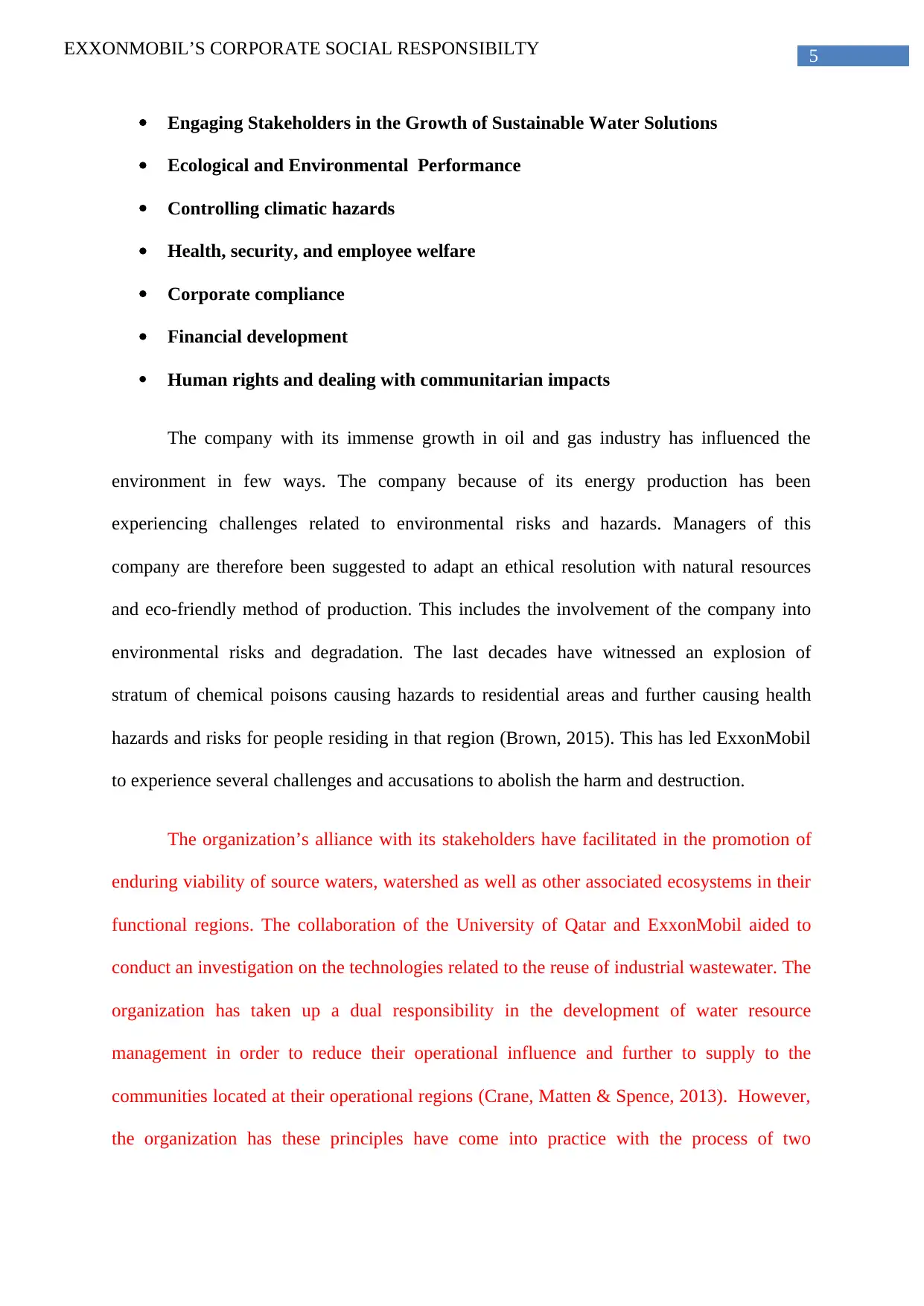
5EXXONMOBIL’S CORPORATE SOCIAL RESPONSIBILTY
Engaging Stakeholders in the Growth of Sustainable Water Solutions
Ecological and Environmental Performance
Controlling climatic hazards
Health, security, and employee welfare
Corporate compliance
Financial development
Human rights and dealing with communitarian impacts
The company with its immense growth in oil and gas industry has influenced the
environment in few ways. The company because of its energy production has been
experiencing challenges related to environmental risks and hazards. Managers of this
company are therefore been suggested to adapt an ethical resolution with natural resources
and eco-friendly method of production. This includes the involvement of the company into
environmental risks and degradation. The last decades have witnessed an explosion of
stratum of chemical poisons causing hazards to residential areas and further causing health
hazards and risks for people residing in that region (Brown, 2015). This has led ExxonMobil
to experience several challenges and accusations to abolish the harm and destruction.
The organization’s alliance with its stakeholders have facilitated in the promotion of
enduring viability of source waters, watershed as well as other associated ecosystems in their
functional regions. The collaboration of the University of Qatar and ExxonMobil aided to
conduct an investigation on the technologies related to the reuse of industrial wastewater. The
organization has taken up a dual responsibility in the development of water resource
management in order to reduce their operational influence and further to supply to the
communities located at their operational regions (Crane, Matten & Spence, 2013). However,
the organization has these principles have come into practice with the process of two
Engaging Stakeholders in the Growth of Sustainable Water Solutions
Ecological and Environmental Performance
Controlling climatic hazards
Health, security, and employee welfare
Corporate compliance
Financial development
Human rights and dealing with communitarian impacts
The company with its immense growth in oil and gas industry has influenced the
environment in few ways. The company because of its energy production has been
experiencing challenges related to environmental risks and hazards. Managers of this
company are therefore been suggested to adapt an ethical resolution with natural resources
and eco-friendly method of production. This includes the involvement of the company into
environmental risks and degradation. The last decades have witnessed an explosion of
stratum of chemical poisons causing hazards to residential areas and further causing health
hazards and risks for people residing in that region (Brown, 2015). This has led ExxonMobil
to experience several challenges and accusations to abolish the harm and destruction.
The organization’s alliance with its stakeholders have facilitated in the promotion of
enduring viability of source waters, watershed as well as other associated ecosystems in their
functional regions. The collaboration of the University of Qatar and ExxonMobil aided to
conduct an investigation on the technologies related to the reuse of industrial wastewater. The
organization has taken up a dual responsibility in the development of water resource
management in order to reduce their operational influence and further to supply to the
communities located at their operational regions (Crane, Matten & Spence, 2013). However,
the organization has these principles have come into practice with the process of two
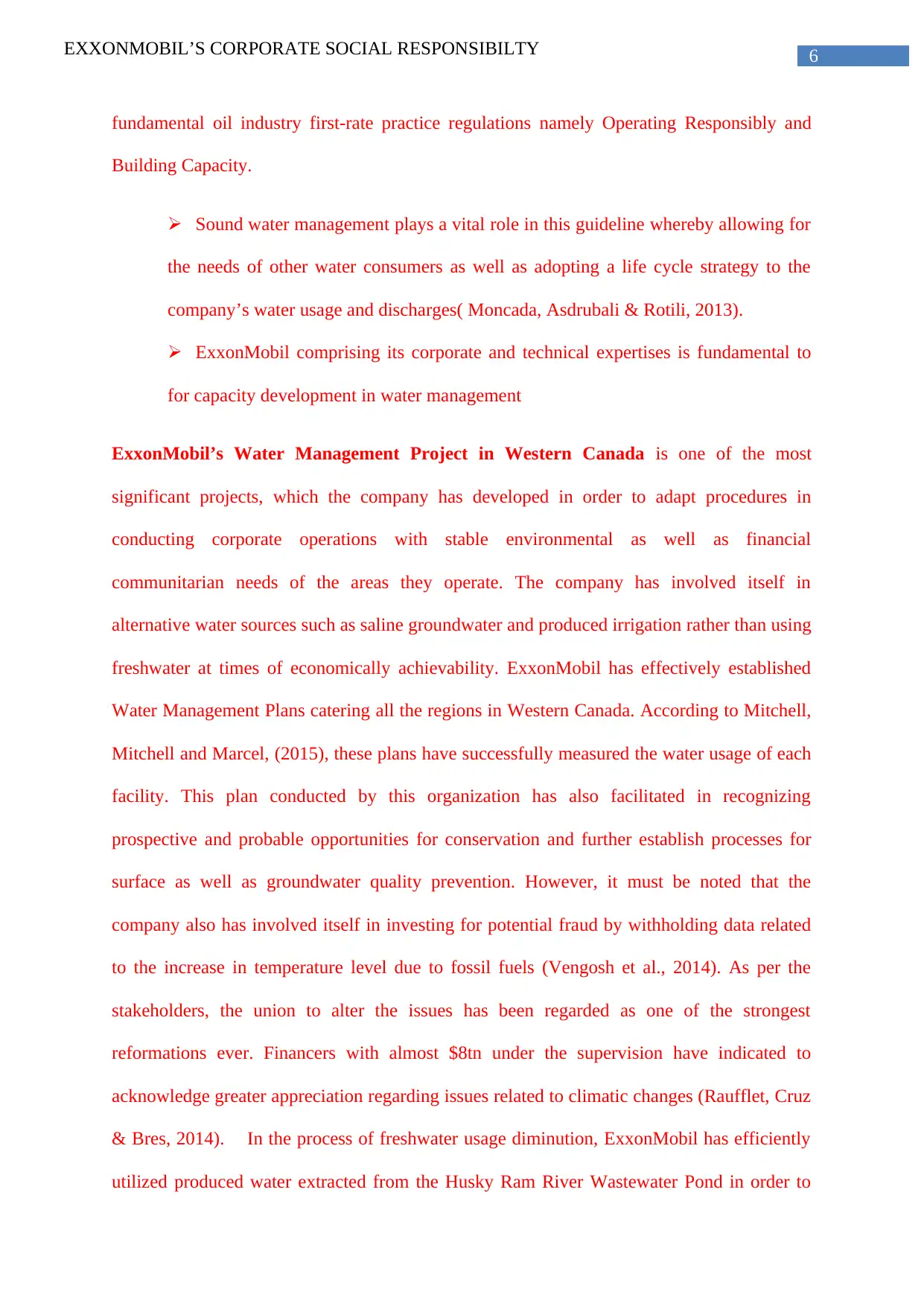
6EXXONMOBIL’S CORPORATE SOCIAL RESPONSIBILTY
fundamental oil industry first-rate practice regulations namely Operating Responsibly and
Building Capacity.
Sound water management plays a vital role in this guideline whereby allowing for
the needs of other water consumers as well as adopting a life cycle strategy to the
company’s water usage and discharges( Moncada, Asdrubali & Rotili, 2013).
ExxonMobil comprising its corporate and technical expertises is fundamental to
for capacity development in water management
ExxonMobil’s Water Management Project in Western Canada is one of the most
significant projects, which the company has developed in order to adapt procedures in
conducting corporate operations with stable environmental as well as financial
communitarian needs of the areas they operate. The company has involved itself in
alternative water sources such as saline groundwater and produced irrigation rather than using
freshwater at times of economically achievability. ExxonMobil has effectively established
Water Management Plans catering all the regions in Western Canada. According to Mitchell,
Mitchell and Marcel, (2015), these plans have successfully measured the water usage of each
facility. This plan conducted by this organization has also facilitated in recognizing
prospective and probable opportunities for conservation and further establish processes for
surface as well as groundwater quality prevention. However, it must be noted that the
company also has involved itself in investing for potential fraud by withholding data related
to the increase in temperature level due to fossil fuels (Vengosh et al., 2014). As per the
stakeholders, the union to alter the issues has been regarded as one of the strongest
reformations ever. Financers with almost $8tn under the supervision have indicated to
acknowledge greater appreciation regarding issues related to climatic changes (Raufflet, Cruz
& Bres, 2014). In the process of freshwater usage diminution, ExxonMobil has efficiently
utilized produced water extracted from the Husky Ram River Wastewater Pond in order to
fundamental oil industry first-rate practice regulations namely Operating Responsibly and
Building Capacity.
Sound water management plays a vital role in this guideline whereby allowing for
the needs of other water consumers as well as adopting a life cycle strategy to the
company’s water usage and discharges( Moncada, Asdrubali & Rotili, 2013).
ExxonMobil comprising its corporate and technical expertises is fundamental to
for capacity development in water management
ExxonMobil’s Water Management Project in Western Canada is one of the most
significant projects, which the company has developed in order to adapt procedures in
conducting corporate operations with stable environmental as well as financial
communitarian needs of the areas they operate. The company has involved itself in
alternative water sources such as saline groundwater and produced irrigation rather than using
freshwater at times of economically achievability. ExxonMobil has effectively established
Water Management Plans catering all the regions in Western Canada. According to Mitchell,
Mitchell and Marcel, (2015), these plans have successfully measured the water usage of each
facility. This plan conducted by this organization has also facilitated in recognizing
prospective and probable opportunities for conservation and further establish processes for
surface as well as groundwater quality prevention. However, it must be noted that the
company also has involved itself in investing for potential fraud by withholding data related
to the increase in temperature level due to fossil fuels (Vengosh et al., 2014). As per the
stakeholders, the union to alter the issues has been regarded as one of the strongest
reformations ever. Financers with almost $8tn under the supervision have indicated to
acknowledge greater appreciation regarding issues related to climatic changes (Raufflet, Cruz
& Bres, 2014). In the process of freshwater usage diminution, ExxonMobil has efficiently
utilized produced water extracted from the Husky Ram River Wastewater Pond in order to
Paraphrase This Document
Need a fresh take? Get an instant paraphrase of this document with our AI Paraphraser
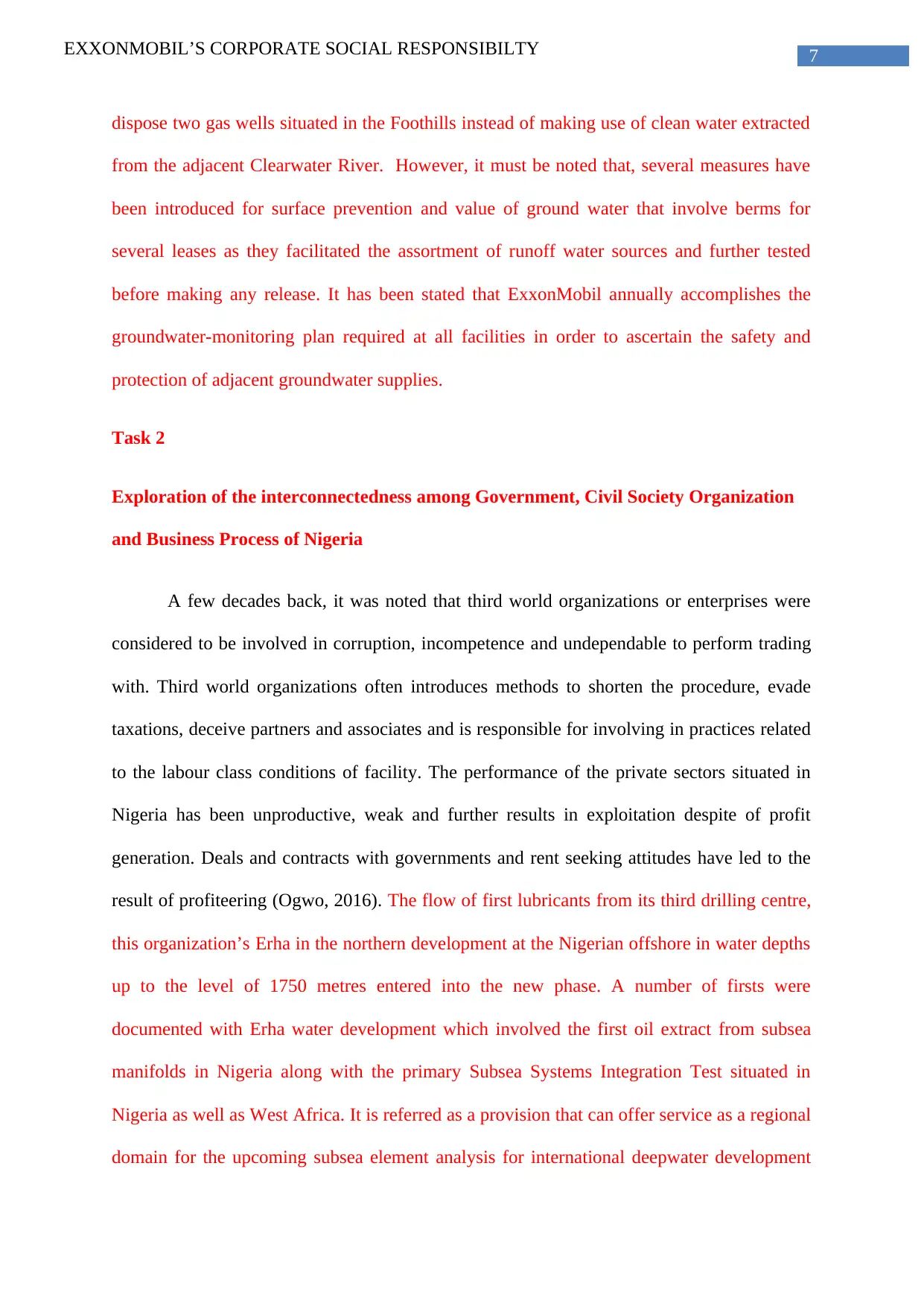
7EXXONMOBIL’S CORPORATE SOCIAL RESPONSIBILTY
dispose two gas wells situated in the Foothills instead of making use of clean water extracted
from the adjacent Clearwater River. However, it must be noted that, several measures have
been introduced for surface prevention and value of ground water that involve berms for
several leases as they facilitated the assortment of runoff water sources and further tested
before making any release. It has been stated that ExxonMobil annually accomplishes the
groundwater-monitoring plan required at all facilities in order to ascertain the safety and
protection of adjacent groundwater supplies.
Task 2
Exploration of the interconnectedness among Government, Civil Society Organization
and Business Process of Nigeria
A few decades back, it was noted that third world organizations or enterprises were
considered to be involved in corruption, incompetence and undependable to perform trading
with. Third world organizations often introduces methods to shorten the procedure, evade
taxations, deceive partners and associates and is responsible for involving in practices related
to the labour class conditions of facility. The performance of the private sectors situated in
Nigeria has been unproductive, weak and further results in exploitation despite of profit
generation. Deals and contracts with governments and rent seeking attitudes have led to the
result of profiteering (Ogwo, 2016). The flow of first lubricants from its third drilling centre,
this organization’s Erha in the northern development at the Nigerian offshore in water depths
up to the level of 1750 metres entered into the new phase. A number of firsts were
documented with Erha water development which involved the first oil extract from subsea
manifolds in Nigeria along with the primary Subsea Systems Integration Test situated in
Nigeria as well as West Africa. It is referred as a provision that can offer service as a regional
domain for the upcoming subsea element analysis for international deepwater development
dispose two gas wells situated in the Foothills instead of making use of clean water extracted
from the adjacent Clearwater River. However, it must be noted that, several measures have
been introduced for surface prevention and value of ground water that involve berms for
several leases as they facilitated the assortment of runoff water sources and further tested
before making any release. It has been stated that ExxonMobil annually accomplishes the
groundwater-monitoring plan required at all facilities in order to ascertain the safety and
protection of adjacent groundwater supplies.
Task 2
Exploration of the interconnectedness among Government, Civil Society Organization
and Business Process of Nigeria
A few decades back, it was noted that third world organizations or enterprises were
considered to be involved in corruption, incompetence and undependable to perform trading
with. Third world organizations often introduces methods to shorten the procedure, evade
taxations, deceive partners and associates and is responsible for involving in practices related
to the labour class conditions of facility. The performance of the private sectors situated in
Nigeria has been unproductive, weak and further results in exploitation despite of profit
generation. Deals and contracts with governments and rent seeking attitudes have led to the
result of profiteering (Ogwo, 2016). The flow of first lubricants from its third drilling centre,
this organization’s Erha in the northern development at the Nigerian offshore in water depths
up to the level of 1750 metres entered into the new phase. A number of firsts were
documented with Erha water development which involved the first oil extract from subsea
manifolds in Nigeria along with the primary Subsea Systems Integration Test situated in
Nigeria as well as West Africa. It is referred as a provision that can offer service as a regional
domain for the upcoming subsea element analysis for international deepwater development
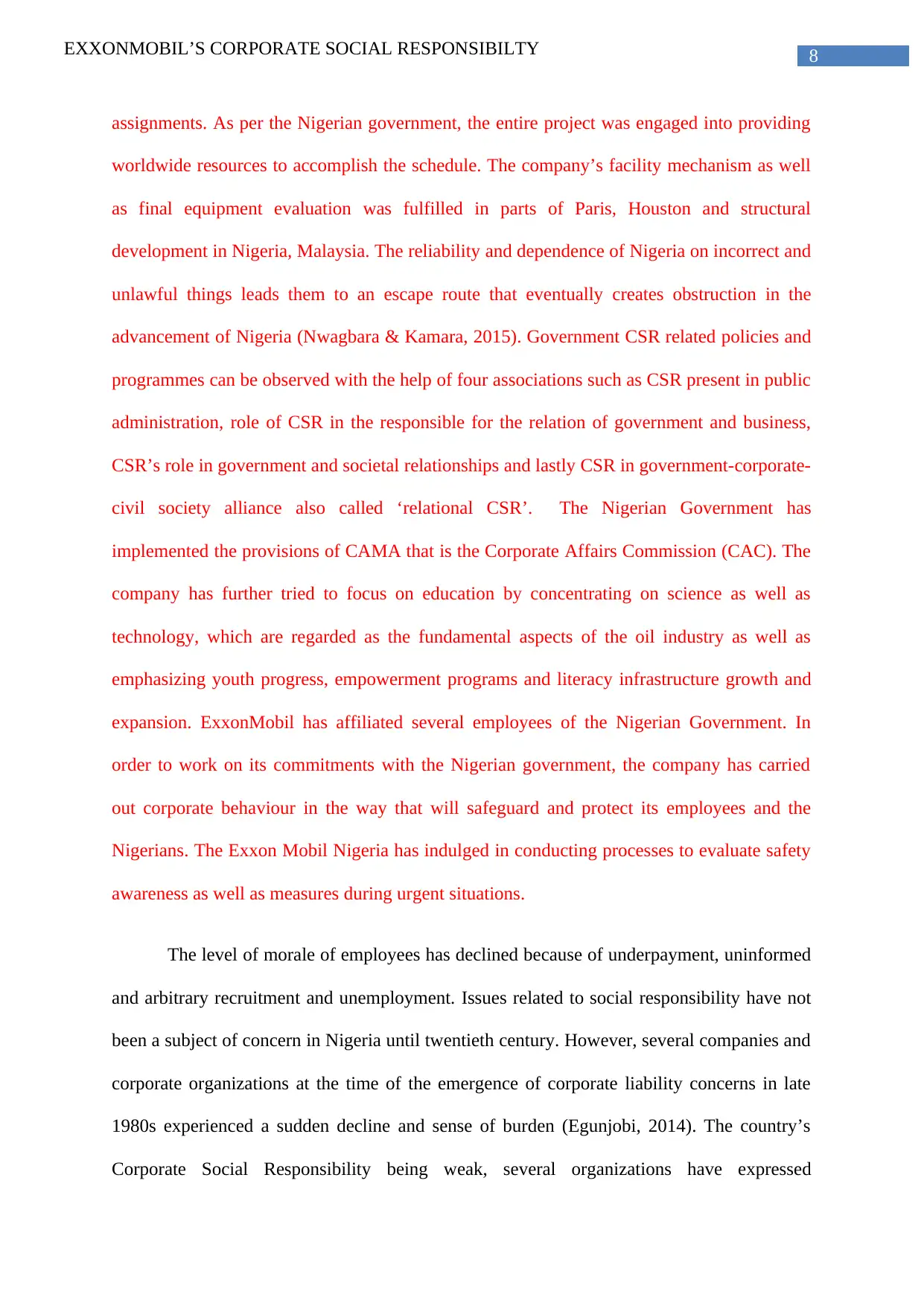
8EXXONMOBIL’S CORPORATE SOCIAL RESPONSIBILTY
assignments. As per the Nigerian government, the entire project was engaged into providing
worldwide resources to accomplish the schedule. The company’s facility mechanism as well
as final equipment evaluation was fulfilled in parts of Paris, Houston and structural
development in Nigeria, Malaysia. The reliability and dependence of Nigeria on incorrect and
unlawful things leads them to an escape route that eventually creates obstruction in the
advancement of Nigeria (Nwagbara & Kamara, 2015). Government CSR related policies and
programmes can be observed with the help of four associations such as CSR present in public
administration, role of CSR in the responsible for the relation of government and business,
CSR’s role in government and societal relationships and lastly CSR in government-corporate-
civil society alliance also called ‘relational CSR’. The Nigerian Government has
implemented the provisions of CAMA that is the Corporate Affairs Commission (CAC). The
company has further tried to focus on education by concentrating on science as well as
technology, which are regarded as the fundamental aspects of the oil industry as well as
emphasizing youth progress, empowerment programs and literacy infrastructure growth and
expansion. ExxonMobil has affiliated several employees of the Nigerian Government. In
order to work on its commitments with the Nigerian government, the company has carried
out corporate behaviour in the way that will safeguard and protect its employees and the
Nigerians. The Exxon Mobil Nigeria has indulged in conducting processes to evaluate safety
awareness as well as measures during urgent situations.
The level of morale of employees has declined because of underpayment, uninformed
and arbitrary recruitment and unemployment. Issues related to social responsibility have not
been a subject of concern in Nigeria until twentieth century. However, several companies and
corporate organizations at the time of the emergence of corporate liability concerns in late
1980s experienced a sudden decline and sense of burden (Egunjobi, 2014). The country’s
Corporate Social Responsibility being weak, several organizations have expressed
assignments. As per the Nigerian government, the entire project was engaged into providing
worldwide resources to accomplish the schedule. The company’s facility mechanism as well
as final equipment evaluation was fulfilled in parts of Paris, Houston and structural
development in Nigeria, Malaysia. The reliability and dependence of Nigeria on incorrect and
unlawful things leads them to an escape route that eventually creates obstruction in the
advancement of Nigeria (Nwagbara & Kamara, 2015). Government CSR related policies and
programmes can be observed with the help of four associations such as CSR present in public
administration, role of CSR in the responsible for the relation of government and business,
CSR’s role in government and societal relationships and lastly CSR in government-corporate-
civil society alliance also called ‘relational CSR’. The Nigerian Government has
implemented the provisions of CAMA that is the Corporate Affairs Commission (CAC). The
company has further tried to focus on education by concentrating on science as well as
technology, which are regarded as the fundamental aspects of the oil industry as well as
emphasizing youth progress, empowerment programs and literacy infrastructure growth and
expansion. ExxonMobil has affiliated several employees of the Nigerian Government. In
order to work on its commitments with the Nigerian government, the company has carried
out corporate behaviour in the way that will safeguard and protect its employees and the
Nigerians. The Exxon Mobil Nigeria has indulged in conducting processes to evaluate safety
awareness as well as measures during urgent situations.
The level of morale of employees has declined because of underpayment, uninformed
and arbitrary recruitment and unemployment. Issues related to social responsibility have not
been a subject of concern in Nigeria until twentieth century. However, several companies and
corporate organizations at the time of the emergence of corporate liability concerns in late
1980s experienced a sudden decline and sense of burden (Egunjobi, 2014). The country’s
Corporate Social Responsibility being weak, several organizations have expressed
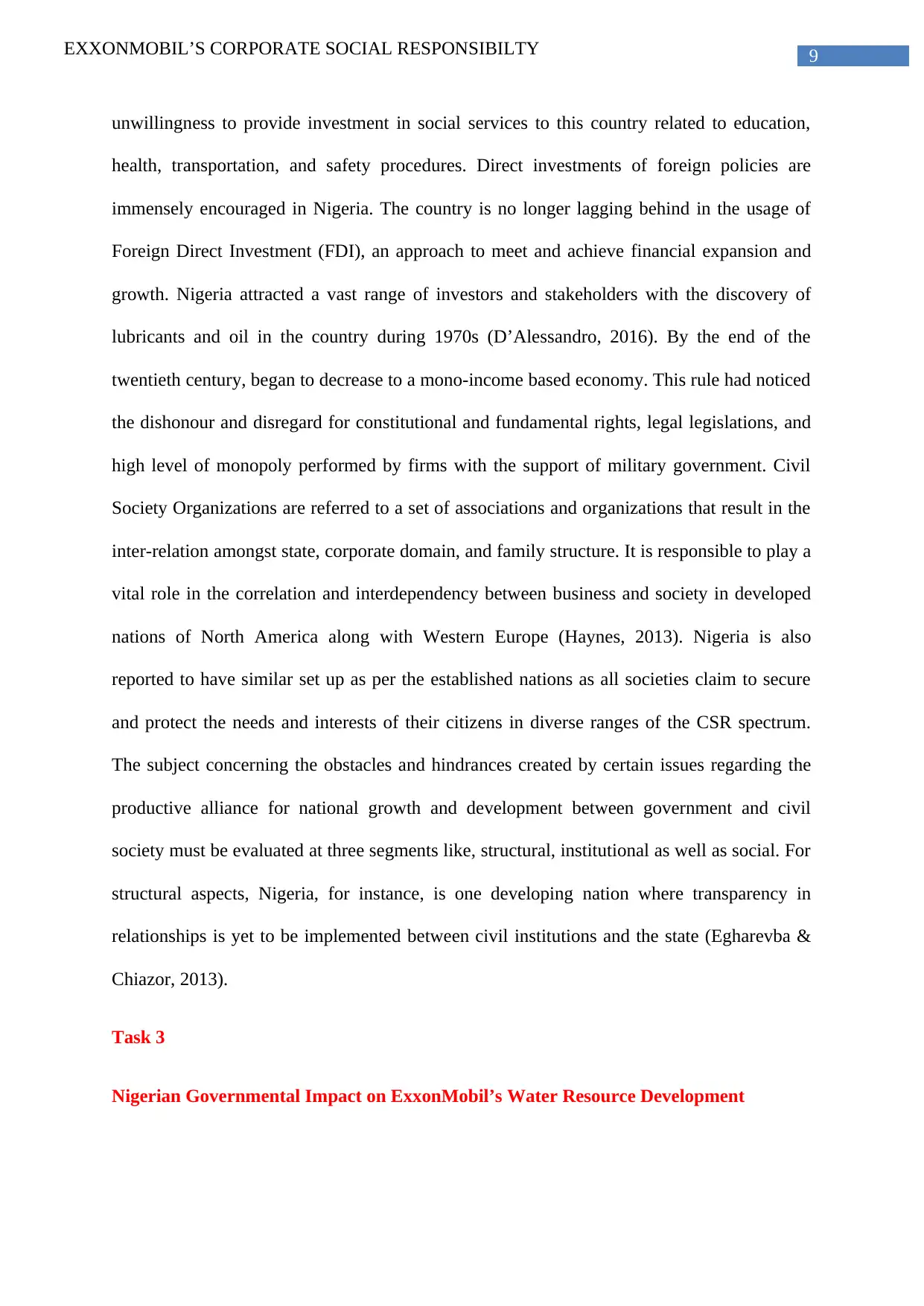
9EXXONMOBIL’S CORPORATE SOCIAL RESPONSIBILTY
unwillingness to provide investment in social services to this country related to education,
health, transportation, and safety procedures. Direct investments of foreign policies are
immensely encouraged in Nigeria. The country is no longer lagging behind in the usage of
Foreign Direct Investment (FDI), an approach to meet and achieve financial expansion and
growth. Nigeria attracted a vast range of investors and stakeholders with the discovery of
lubricants and oil in the country during 1970s (D’Alessandro, 2016). By the end of the
twentieth century, began to decrease to a mono-income based economy. This rule had noticed
the dishonour and disregard for constitutional and fundamental rights, legal legislations, and
high level of monopoly performed by firms with the support of military government. Civil
Society Organizations are referred to a set of associations and organizations that result in the
inter-relation amongst state, corporate domain, and family structure. It is responsible to play a
vital role in the correlation and interdependency between business and society in developed
nations of North America along with Western Europe (Haynes, 2013). Nigeria is also
reported to have similar set up as per the established nations as all societies claim to secure
and protect the needs and interests of their citizens in diverse ranges of the CSR spectrum.
The subject concerning the obstacles and hindrances created by certain issues regarding the
productive alliance for national growth and development between government and civil
society must be evaluated at three segments like, structural, institutional as well as social. For
structural aspects, Nigeria, for instance, is one developing nation where transparency in
relationships is yet to be implemented between civil institutions and the state (Egharevba &
Chiazor, 2013).
Task 3
Nigerian Governmental Impact on ExxonMobil’s Water Resource Development
unwillingness to provide investment in social services to this country related to education,
health, transportation, and safety procedures. Direct investments of foreign policies are
immensely encouraged in Nigeria. The country is no longer lagging behind in the usage of
Foreign Direct Investment (FDI), an approach to meet and achieve financial expansion and
growth. Nigeria attracted a vast range of investors and stakeholders with the discovery of
lubricants and oil in the country during 1970s (D’Alessandro, 2016). By the end of the
twentieth century, began to decrease to a mono-income based economy. This rule had noticed
the dishonour and disregard for constitutional and fundamental rights, legal legislations, and
high level of monopoly performed by firms with the support of military government. Civil
Society Organizations are referred to a set of associations and organizations that result in the
inter-relation amongst state, corporate domain, and family structure. It is responsible to play a
vital role in the correlation and interdependency between business and society in developed
nations of North America along with Western Europe (Haynes, 2013). Nigeria is also
reported to have similar set up as per the established nations as all societies claim to secure
and protect the needs and interests of their citizens in diverse ranges of the CSR spectrum.
The subject concerning the obstacles and hindrances created by certain issues regarding the
productive alliance for national growth and development between government and civil
society must be evaluated at three segments like, structural, institutional as well as social. For
structural aspects, Nigeria, for instance, is one developing nation where transparency in
relationships is yet to be implemented between civil institutions and the state (Egharevba &
Chiazor, 2013).
Task 3
Nigerian Governmental Impact on ExxonMobil’s Water Resource Development
Secure Best Marks with AI Grader
Need help grading? Try our AI Grader for instant feedback on your assignments.
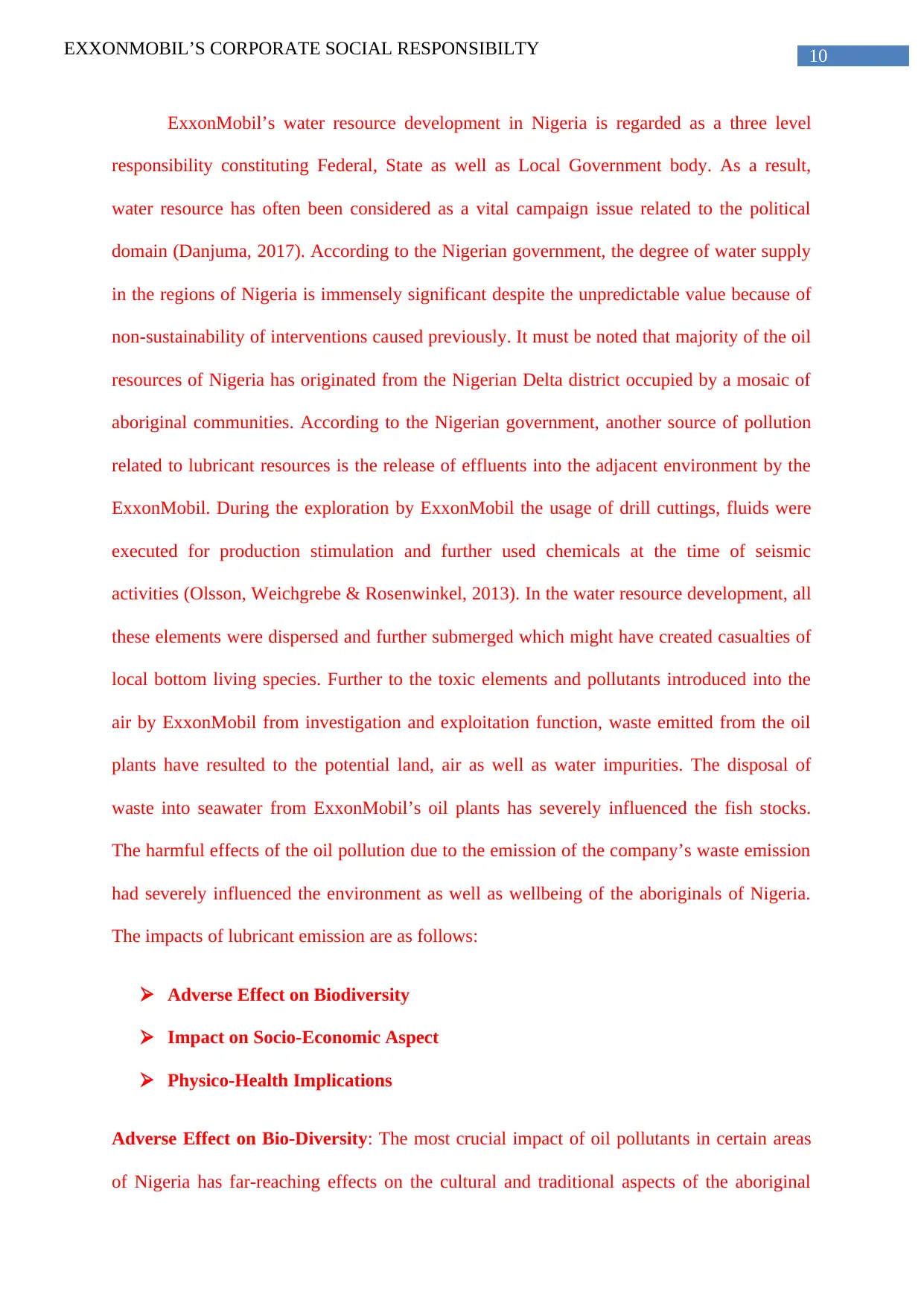
10EXXONMOBIL’S CORPORATE SOCIAL RESPONSIBILTY
ExxonMobil’s water resource development in Nigeria is regarded as a three level
responsibility constituting Federal, State as well as Local Government body. As a result,
water resource has often been considered as a vital campaign issue related to the political
domain (Danjuma, 2017). According to the Nigerian government, the degree of water supply
in the regions of Nigeria is immensely significant despite the unpredictable value because of
non-sustainability of interventions caused previously. It must be noted that majority of the oil
resources of Nigeria has originated from the Nigerian Delta district occupied by a mosaic of
aboriginal communities. According to the Nigerian government, another source of pollution
related to lubricant resources is the release of effluents into the adjacent environment by the
ExxonMobil. During the exploration by ExxonMobil the usage of drill cuttings, fluids were
executed for production stimulation and further used chemicals at the time of seismic
activities (Olsson, Weichgrebe & Rosenwinkel, 2013). In the water resource development, all
these elements were dispersed and further submerged which might have created casualties of
local bottom living species. Further to the toxic elements and pollutants introduced into the
air by ExxonMobil from investigation and exploitation function, waste emitted from the oil
plants have resulted to the potential land, air as well as water impurities. The disposal of
waste into seawater from ExxonMobil’s oil plants has severely influenced the fish stocks.
The harmful effects of the oil pollution due to the emission of the company’s waste emission
had severely influenced the environment as well as wellbeing of the aboriginals of Nigeria.
The impacts of lubricant emission are as follows:
Adverse Effect on Biodiversity
Impact on Socio-Economic Aspect
Physico-Health Implications
Adverse Effect on Bio-Diversity: The most crucial impact of oil pollutants in certain areas
of Nigeria has far-reaching effects on the cultural and traditional aspects of the aboriginal
ExxonMobil’s water resource development in Nigeria is regarded as a three level
responsibility constituting Federal, State as well as Local Government body. As a result,
water resource has often been considered as a vital campaign issue related to the political
domain (Danjuma, 2017). According to the Nigerian government, the degree of water supply
in the regions of Nigeria is immensely significant despite the unpredictable value because of
non-sustainability of interventions caused previously. It must be noted that majority of the oil
resources of Nigeria has originated from the Nigerian Delta district occupied by a mosaic of
aboriginal communities. According to the Nigerian government, another source of pollution
related to lubricant resources is the release of effluents into the adjacent environment by the
ExxonMobil. During the exploration by ExxonMobil the usage of drill cuttings, fluids were
executed for production stimulation and further used chemicals at the time of seismic
activities (Olsson, Weichgrebe & Rosenwinkel, 2013). In the water resource development, all
these elements were dispersed and further submerged which might have created casualties of
local bottom living species. Further to the toxic elements and pollutants introduced into the
air by ExxonMobil from investigation and exploitation function, waste emitted from the oil
plants have resulted to the potential land, air as well as water impurities. The disposal of
waste into seawater from ExxonMobil’s oil plants has severely influenced the fish stocks.
The harmful effects of the oil pollution due to the emission of the company’s waste emission
had severely influenced the environment as well as wellbeing of the aboriginals of Nigeria.
The impacts of lubricant emission are as follows:
Adverse Effect on Biodiversity
Impact on Socio-Economic Aspect
Physico-Health Implications
Adverse Effect on Bio-Diversity: The most crucial impact of oil pollutants in certain areas
of Nigeria has far-reaching effects on the cultural and traditional aspects of the aboriginal
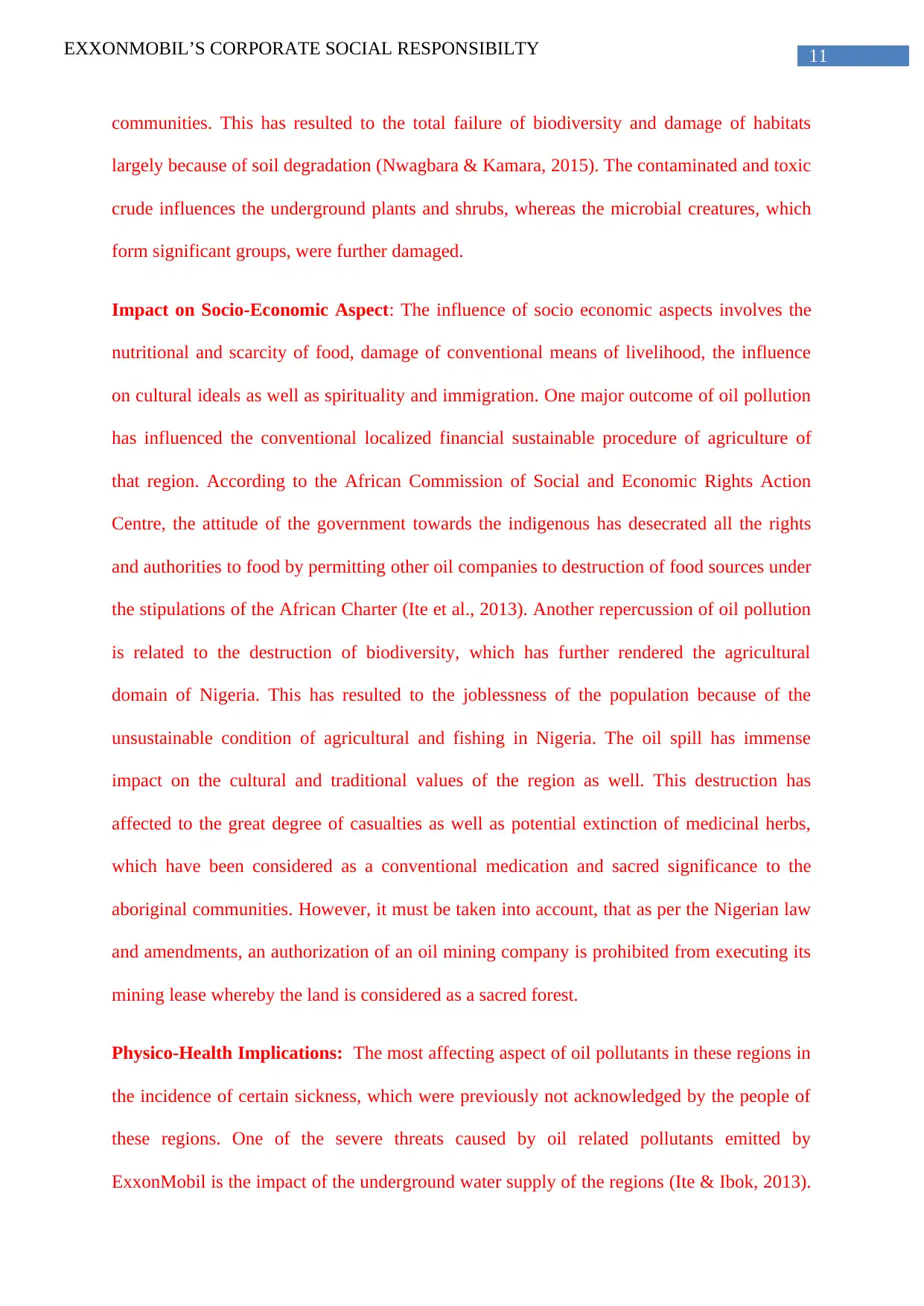
11EXXONMOBIL’S CORPORATE SOCIAL RESPONSIBILTY
communities. This has resulted to the total failure of biodiversity and damage of habitats
largely because of soil degradation (Nwagbara & Kamara, 2015). The contaminated and toxic
crude influences the underground plants and shrubs, whereas the microbial creatures, which
form significant groups, were further damaged.
Impact on Socio-Economic Aspect: The influence of socio economic aspects involves the
nutritional and scarcity of food, damage of conventional means of livelihood, the influence
on cultural ideals as well as spirituality and immigration. One major outcome of oil pollution
has influenced the conventional localized financial sustainable procedure of agriculture of
that region. According to the African Commission of Social and Economic Rights Action
Centre, the attitude of the government towards the indigenous has desecrated all the rights
and authorities to food by permitting other oil companies to destruction of food sources under
the stipulations of the African Charter (Ite et al., 2013). Another repercussion of oil pollution
is related to the destruction of biodiversity, which has further rendered the agricultural
domain of Nigeria. This has resulted to the joblessness of the population because of the
unsustainable condition of agricultural and fishing in Nigeria. The oil spill has immense
impact on the cultural and traditional values of the region as well. This destruction has
affected to the great degree of casualties as well as potential extinction of medicinal herbs,
which have been considered as a conventional medication and sacred significance to the
aboriginal communities. However, it must be taken into account, that as per the Nigerian law
and amendments, an authorization of an oil mining company is prohibited from executing its
mining lease whereby the land is considered as a sacred forest.
Physico-Health Implications: The most affecting aspect of oil pollutants in these regions in
the incidence of certain sickness, which were previously not acknowledged by the people of
these regions. One of the severe threats caused by oil related pollutants emitted by
ExxonMobil is the impact of the underground water supply of the regions (Ite & Ibok, 2013).
communities. This has resulted to the total failure of biodiversity and damage of habitats
largely because of soil degradation (Nwagbara & Kamara, 2015). The contaminated and toxic
crude influences the underground plants and shrubs, whereas the microbial creatures, which
form significant groups, were further damaged.
Impact on Socio-Economic Aspect: The influence of socio economic aspects involves the
nutritional and scarcity of food, damage of conventional means of livelihood, the influence
on cultural ideals as well as spirituality and immigration. One major outcome of oil pollution
has influenced the conventional localized financial sustainable procedure of agriculture of
that region. According to the African Commission of Social and Economic Rights Action
Centre, the attitude of the government towards the indigenous has desecrated all the rights
and authorities to food by permitting other oil companies to destruction of food sources under
the stipulations of the African Charter (Ite et al., 2013). Another repercussion of oil pollution
is related to the destruction of biodiversity, which has further rendered the agricultural
domain of Nigeria. This has resulted to the joblessness of the population because of the
unsustainable condition of agricultural and fishing in Nigeria. The oil spill has immense
impact on the cultural and traditional values of the region as well. This destruction has
affected to the great degree of casualties as well as potential extinction of medicinal herbs,
which have been considered as a conventional medication and sacred significance to the
aboriginal communities. However, it must be taken into account, that as per the Nigerian law
and amendments, an authorization of an oil mining company is prohibited from executing its
mining lease whereby the land is considered as a sacred forest.
Physico-Health Implications: The most affecting aspect of oil pollutants in these regions in
the incidence of certain sickness, which were previously not acknowledged by the people of
these regions. One of the severe threats caused by oil related pollutants emitted by
ExxonMobil is the impact of the underground water supply of the regions (Ite & Ibok, 2013).
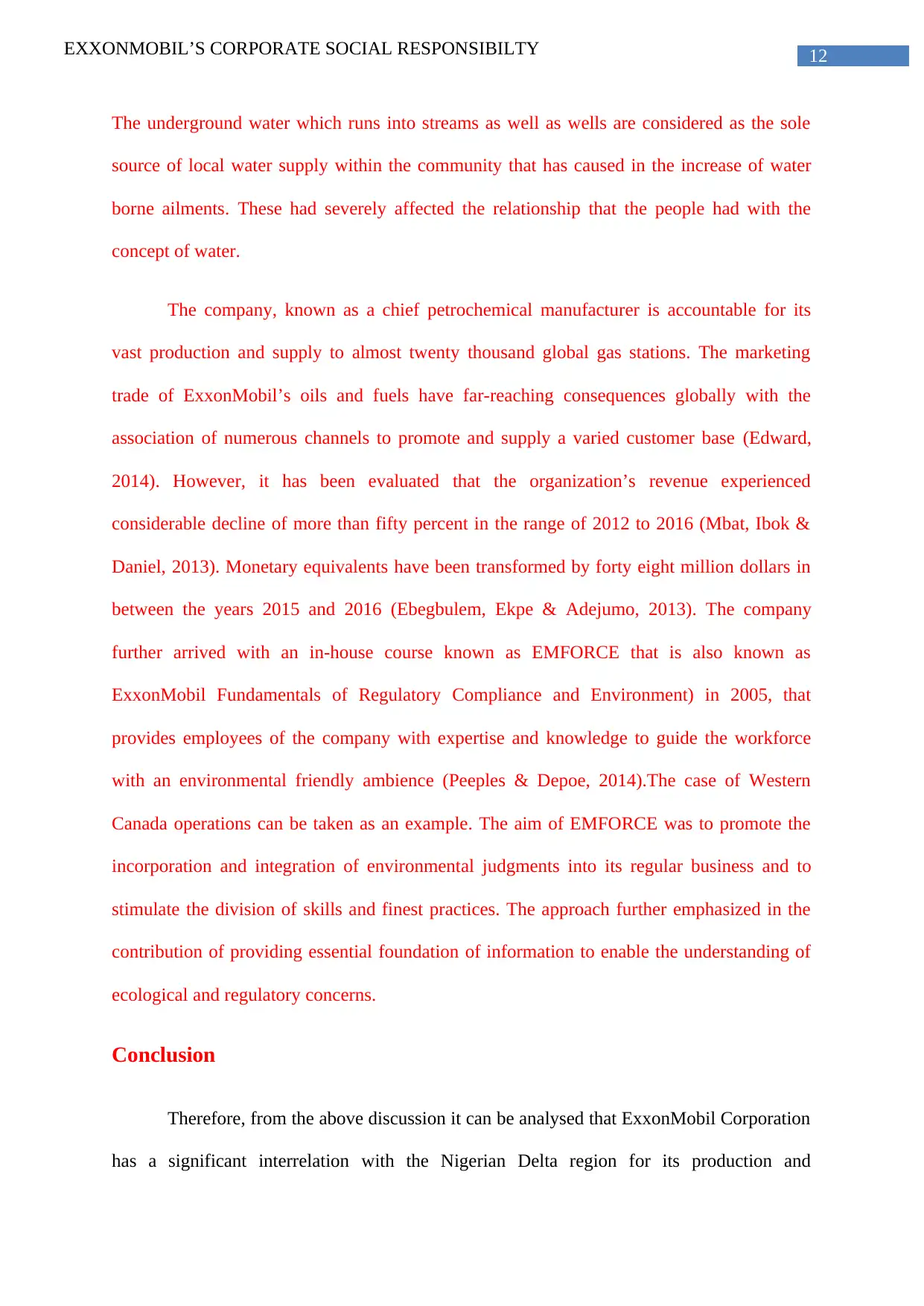
12EXXONMOBIL’S CORPORATE SOCIAL RESPONSIBILTY
The underground water which runs into streams as well as wells are considered as the sole
source of local water supply within the community that has caused in the increase of water
borne ailments. These had severely affected the relationship that the people had with the
concept of water.
The company, known as a chief petrochemical manufacturer is accountable for its
vast production and supply to almost twenty thousand global gas stations. The marketing
trade of ExxonMobil’s oils and fuels have far-reaching consequences globally with the
association of numerous channels to promote and supply a varied customer base (Edward,
2014). However, it has been evaluated that the organization’s revenue experienced
considerable decline of more than fifty percent in the range of 2012 to 2016 (Mbat, Ibok &
Daniel, 2013). Monetary equivalents have been transformed by forty eight million dollars in
between the years 2015 and 2016 (Ebegbulem, Ekpe & Adejumo, 2013). The company
further arrived with an in-house course known as EMFORCE that is also known as
ExxonMobil Fundamentals of Regulatory Compliance and Environment) in 2005, that
provides employees of the company with expertise and knowledge to guide the workforce
with an environmental friendly ambience (Peeples & Depoe, 2014).The case of Western
Canada operations can be taken as an example. The aim of EMFORCE was to promote the
incorporation and integration of environmental judgments into its regular business and to
stimulate the division of skills and finest practices. The approach further emphasized in the
contribution of providing essential foundation of information to enable the understanding of
ecological and regulatory concerns.
Conclusion
Therefore, from the above discussion it can be analysed that ExxonMobil Corporation
has a significant interrelation with the Nigerian Delta region for its production and
The underground water which runs into streams as well as wells are considered as the sole
source of local water supply within the community that has caused in the increase of water
borne ailments. These had severely affected the relationship that the people had with the
concept of water.
The company, known as a chief petrochemical manufacturer is accountable for its
vast production and supply to almost twenty thousand global gas stations. The marketing
trade of ExxonMobil’s oils and fuels have far-reaching consequences globally with the
association of numerous channels to promote and supply a varied customer base (Edward,
2014). However, it has been evaluated that the organization’s revenue experienced
considerable decline of more than fifty percent in the range of 2012 to 2016 (Mbat, Ibok &
Daniel, 2013). Monetary equivalents have been transformed by forty eight million dollars in
between the years 2015 and 2016 (Ebegbulem, Ekpe & Adejumo, 2013). The company
further arrived with an in-house course known as EMFORCE that is also known as
ExxonMobil Fundamentals of Regulatory Compliance and Environment) in 2005, that
provides employees of the company with expertise and knowledge to guide the workforce
with an environmental friendly ambience (Peeples & Depoe, 2014).The case of Western
Canada operations can be taken as an example. The aim of EMFORCE was to promote the
incorporation and integration of environmental judgments into its regular business and to
stimulate the division of skills and finest practices. The approach further emphasized in the
contribution of providing essential foundation of information to enable the understanding of
ecological and regulatory concerns.
Conclusion
Therefore, from the above discussion it can be analysed that ExxonMobil Corporation
has a significant interrelation with the Nigerian Delta region for its production and
Paraphrase This Document
Need a fresh take? Get an instant paraphrase of this document with our AI Paraphraser
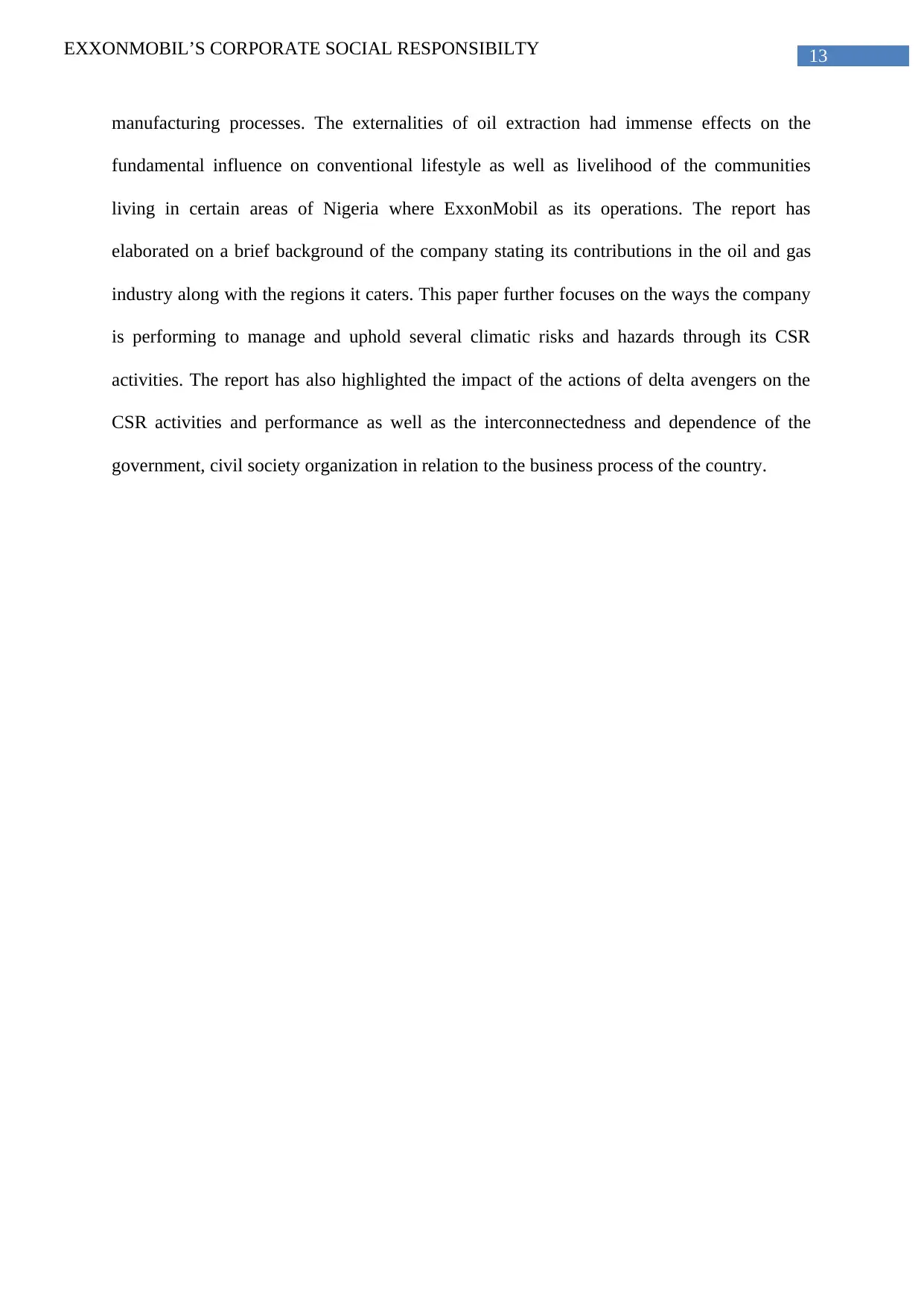
13EXXONMOBIL’S CORPORATE SOCIAL RESPONSIBILTY
manufacturing processes. The externalities of oil extraction had immense effects on the
fundamental influence on conventional lifestyle as well as livelihood of the communities
living in certain areas of Nigeria where ExxonMobil as its operations. The report has
elaborated on a brief background of the company stating its contributions in the oil and gas
industry along with the regions it caters. This paper further focuses on the ways the company
is performing to manage and uphold several climatic risks and hazards through its CSR
activities. The report has also highlighted the impact of the actions of delta avengers on the
CSR activities and performance as well as the interconnectedness and dependence of the
government, civil society organization in relation to the business process of the country.
manufacturing processes. The externalities of oil extraction had immense effects on the
fundamental influence on conventional lifestyle as well as livelihood of the communities
living in certain areas of Nigeria where ExxonMobil as its operations. The report has
elaborated on a brief background of the company stating its contributions in the oil and gas
industry along with the regions it caters. This paper further focuses on the ways the company
is performing to manage and uphold several climatic risks and hazards through its CSR
activities. The report has also highlighted the impact of the actions of delta avengers on the
CSR activities and performance as well as the interconnectedness and dependence of the
government, civil society organization in relation to the business process of the country.
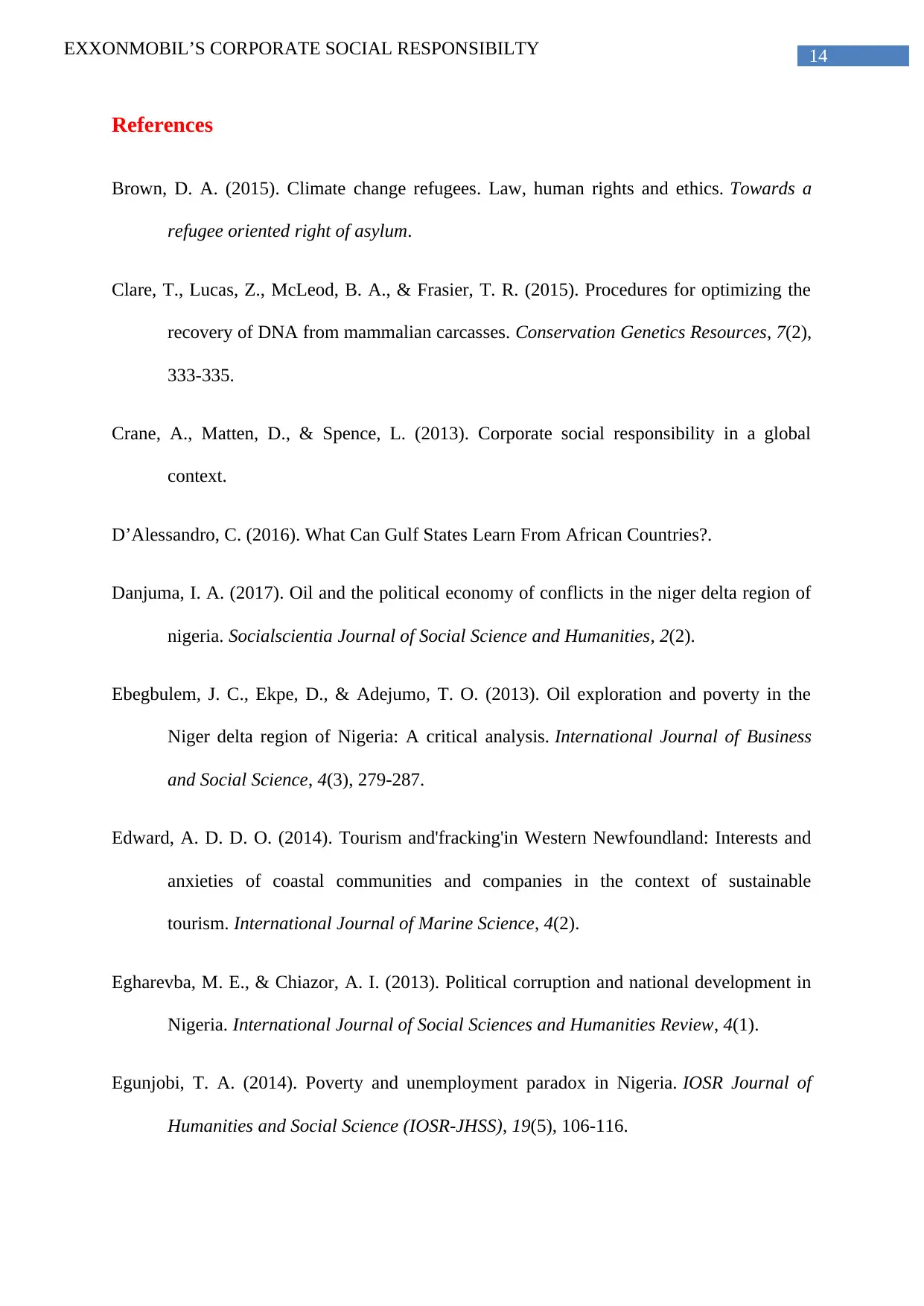
14EXXONMOBIL’S CORPORATE SOCIAL RESPONSIBILTY
References
Brown, D. A. (2015). Climate change refugees. Law, human rights and ethics. Towards a
refugee oriented right of asylum.
Clare, T., Lucas, Z., McLeod, B. A., & Frasier, T. R. (2015). Procedures for optimizing the
recovery of DNA from mammalian carcasses. Conservation Genetics Resources, 7(2),
333-335.
Crane, A., Matten, D., & Spence, L. (2013). Corporate social responsibility in a global
context.
D’Alessandro, C. (2016). What Can Gulf States Learn From African Countries?.
Danjuma, I. A. (2017). Oil and the political economy of conflicts in the niger delta region of
nigeria. Socialscientia Journal of Social Science and Humanities, 2(2).
Ebegbulem, J. C., Ekpe, D., & Adejumo, T. O. (2013). Oil exploration and poverty in the
Niger delta region of Nigeria: A critical analysis. International Journal of Business
and Social Science, 4(3), 279-287.
Edward, A. D. D. O. (2014). Tourism and'fracking'in Western Newfoundland: Interests and
anxieties of coastal communities and companies in the context of sustainable
tourism. International Journal of Marine Science, 4(2).
Egharevba, M. E., & Chiazor, A. I. (2013). Political corruption and national development in
Nigeria. International Journal of Social Sciences and Humanities Review, 4(1).
Egunjobi, T. A. (2014). Poverty and unemployment paradox in Nigeria. IOSR Journal of
Humanities and Social Science (IOSR-JHSS), 19(5), 106-116.
References
Brown, D. A. (2015). Climate change refugees. Law, human rights and ethics. Towards a
refugee oriented right of asylum.
Clare, T., Lucas, Z., McLeod, B. A., & Frasier, T. R. (2015). Procedures for optimizing the
recovery of DNA from mammalian carcasses. Conservation Genetics Resources, 7(2),
333-335.
Crane, A., Matten, D., & Spence, L. (2013). Corporate social responsibility in a global
context.
D’Alessandro, C. (2016). What Can Gulf States Learn From African Countries?.
Danjuma, I. A. (2017). Oil and the political economy of conflicts in the niger delta region of
nigeria. Socialscientia Journal of Social Science and Humanities, 2(2).
Ebegbulem, J. C., Ekpe, D., & Adejumo, T. O. (2013). Oil exploration and poverty in the
Niger delta region of Nigeria: A critical analysis. International Journal of Business
and Social Science, 4(3), 279-287.
Edward, A. D. D. O. (2014). Tourism and'fracking'in Western Newfoundland: Interests and
anxieties of coastal communities and companies in the context of sustainable
tourism. International Journal of Marine Science, 4(2).
Egharevba, M. E., & Chiazor, A. I. (2013). Political corruption and national development in
Nigeria. International Journal of Social Sciences and Humanities Review, 4(1).
Egunjobi, T. A. (2014). Poverty and unemployment paradox in Nigeria. IOSR Journal of
Humanities and Social Science (IOSR-JHSS), 19(5), 106-116.
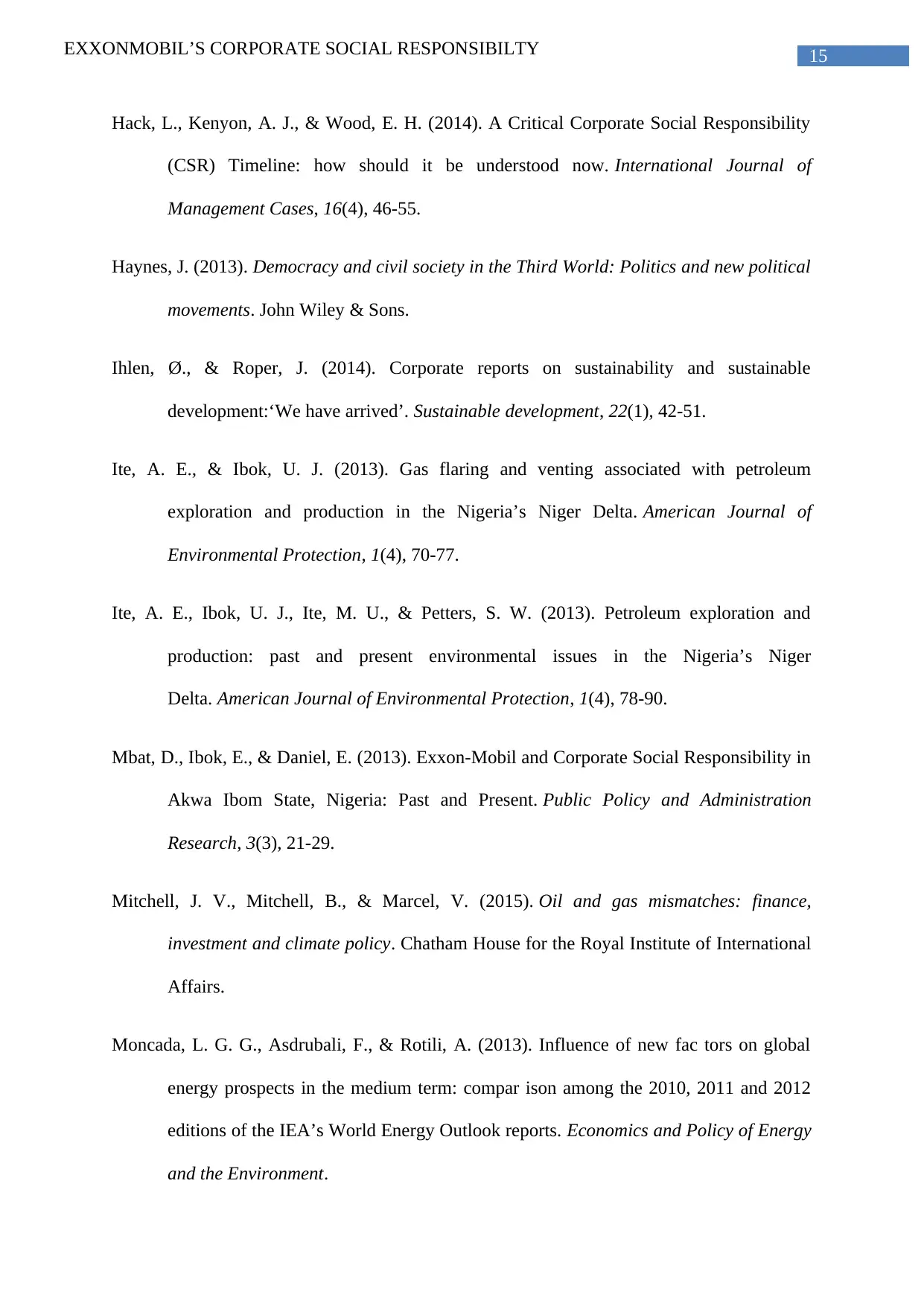
15EXXONMOBIL’S CORPORATE SOCIAL RESPONSIBILTY
Hack, L., Kenyon, A. J., & Wood, E. H. (2014). A Critical Corporate Social Responsibility
(CSR) Timeline: how should it be understood now. International Journal of
Management Cases, 16(4), 46-55.
Haynes, J. (2013). Democracy and civil society in the Third World: Politics and new political
movements. John Wiley & Sons.
Ihlen, Ø., & Roper, J. (2014). Corporate reports on sustainability and sustainable
development:‘We have arrived’. Sustainable development, 22(1), 42-51.
Ite, A. E., & Ibok, U. J. (2013). Gas flaring and venting associated with petroleum
exploration and production in the Nigeria’s Niger Delta. American Journal of
Environmental Protection, 1(4), 70-77.
Ite, A. E., Ibok, U. J., Ite, M. U., & Petters, S. W. (2013). Petroleum exploration and
production: past and present environmental issues in the Nigeria’s Niger
Delta. American Journal of Environmental Protection, 1(4), 78-90.
Mbat, D., Ibok, E., & Daniel, E. (2013). Exxon-Mobil and Corporate Social Responsibility in
Akwa Ibom State, Nigeria: Past and Present. Public Policy and Administration
Research, 3(3), 21-29.
Mitchell, J. V., Mitchell, B., & Marcel, V. (2015). Oil and gas mismatches: finance,
investment and climate policy. Chatham House for the Royal Institute of International
Affairs.
Moncada, L. G. G., Asdrubali, F., & Rotili, A. (2013). Influence of new fac tors on global
energy prospects in the medium term: compar ison among the 2010, 2011 and 2012
editions of the IEA’s World Energy Outlook reports. Economics and Policy of Energy
and the Environment.
Hack, L., Kenyon, A. J., & Wood, E. H. (2014). A Critical Corporate Social Responsibility
(CSR) Timeline: how should it be understood now. International Journal of
Management Cases, 16(4), 46-55.
Haynes, J. (2013). Democracy and civil society in the Third World: Politics and new political
movements. John Wiley & Sons.
Ihlen, Ø., & Roper, J. (2014). Corporate reports on sustainability and sustainable
development:‘We have arrived’. Sustainable development, 22(1), 42-51.
Ite, A. E., & Ibok, U. J. (2013). Gas flaring and venting associated with petroleum
exploration and production in the Nigeria’s Niger Delta. American Journal of
Environmental Protection, 1(4), 70-77.
Ite, A. E., Ibok, U. J., Ite, M. U., & Petters, S. W. (2013). Petroleum exploration and
production: past and present environmental issues in the Nigeria’s Niger
Delta. American Journal of Environmental Protection, 1(4), 78-90.
Mbat, D., Ibok, E., & Daniel, E. (2013). Exxon-Mobil and Corporate Social Responsibility in
Akwa Ibom State, Nigeria: Past and Present. Public Policy and Administration
Research, 3(3), 21-29.
Mitchell, J. V., Mitchell, B., & Marcel, V. (2015). Oil and gas mismatches: finance,
investment and climate policy. Chatham House for the Royal Institute of International
Affairs.
Moncada, L. G. G., Asdrubali, F., & Rotili, A. (2013). Influence of new fac tors on global
energy prospects in the medium term: compar ison among the 2010, 2011 and 2012
editions of the IEA’s World Energy Outlook reports. Economics and Policy of Energy
and the Environment.
Secure Best Marks with AI Grader
Need help grading? Try our AI Grader for instant feedback on your assignments.
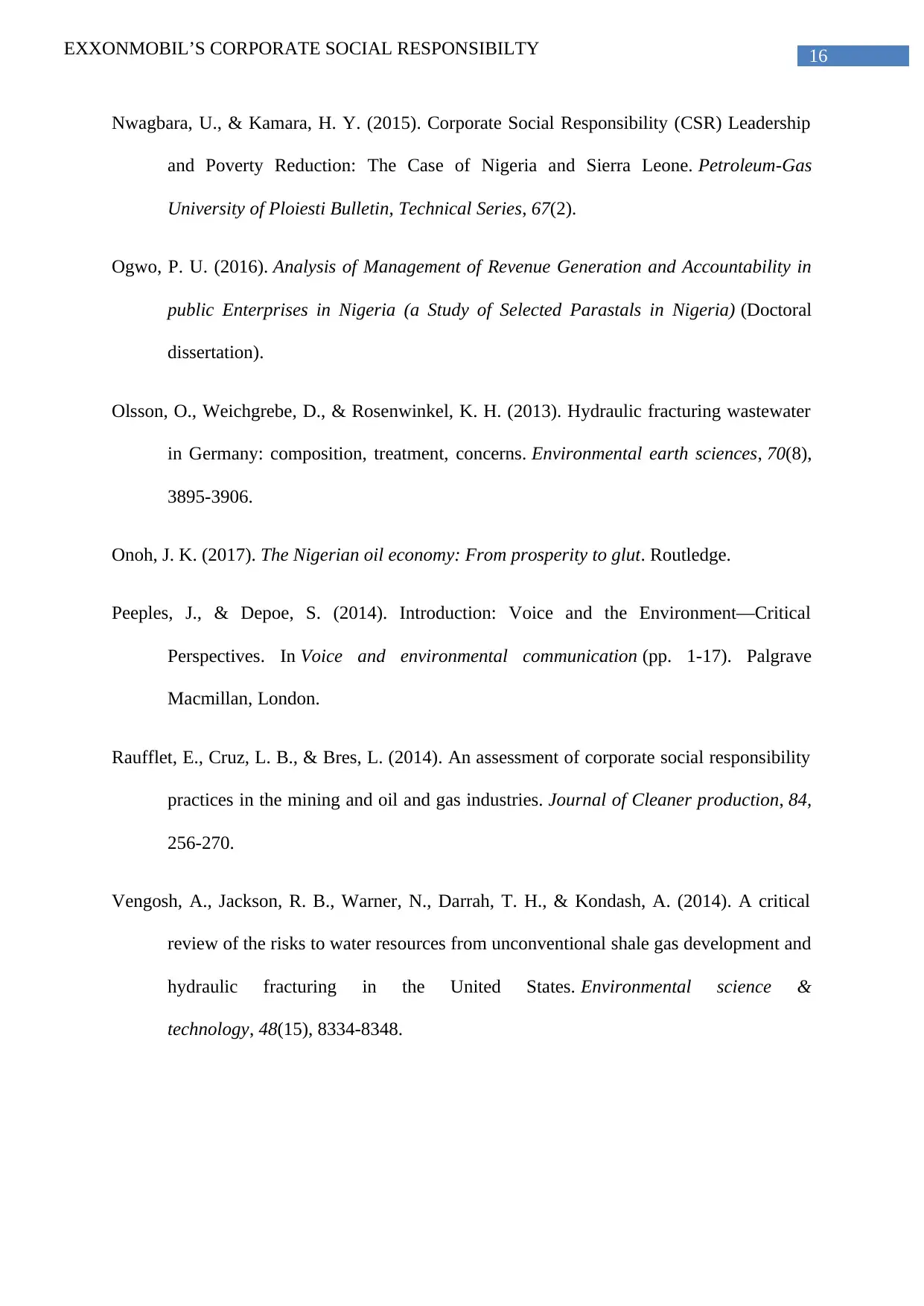
16EXXONMOBIL’S CORPORATE SOCIAL RESPONSIBILTY
Nwagbara, U., & Kamara, H. Y. (2015). Corporate Social Responsibility (CSR) Leadership
and Poverty Reduction: The Case of Nigeria and Sierra Leone. Petroleum-Gas
University of Ploiesti Bulletin, Technical Series, 67(2).
Ogwo, P. U. (2016). Analysis of Management of Revenue Generation and Accountability in
public Enterprises in Nigeria (a Study of Selected Parastals in Nigeria) (Doctoral
dissertation).
Olsson, O., Weichgrebe, D., & Rosenwinkel, K. H. (2013). Hydraulic fracturing wastewater
in Germany: composition, treatment, concerns. Environmental earth sciences, 70(8),
3895-3906.
Onoh, J. K. (2017). The Nigerian oil economy: From prosperity to glut. Routledge.
Peeples, J., & Depoe, S. (2014). Introduction: Voice and the Environment—Critical
Perspectives. In Voice and environmental communication (pp. 1-17). Palgrave
Macmillan, London.
Raufflet, E., Cruz, L. B., & Bres, L. (2014). An assessment of corporate social responsibility
practices in the mining and oil and gas industries. Journal of Cleaner production, 84,
256-270.
Vengosh, A., Jackson, R. B., Warner, N., Darrah, T. H., & Kondash, A. (2014). A critical
review of the risks to water resources from unconventional shale gas development and
hydraulic fracturing in the United States. Environmental science &
technology, 48(15), 8334-8348.
Nwagbara, U., & Kamara, H. Y. (2015). Corporate Social Responsibility (CSR) Leadership
and Poverty Reduction: The Case of Nigeria and Sierra Leone. Petroleum-Gas
University of Ploiesti Bulletin, Technical Series, 67(2).
Ogwo, P. U. (2016). Analysis of Management of Revenue Generation and Accountability in
public Enterprises in Nigeria (a Study of Selected Parastals in Nigeria) (Doctoral
dissertation).
Olsson, O., Weichgrebe, D., & Rosenwinkel, K. H. (2013). Hydraulic fracturing wastewater
in Germany: composition, treatment, concerns. Environmental earth sciences, 70(8),
3895-3906.
Onoh, J. K. (2017). The Nigerian oil economy: From prosperity to glut. Routledge.
Peeples, J., & Depoe, S. (2014). Introduction: Voice and the Environment—Critical
Perspectives. In Voice and environmental communication (pp. 1-17). Palgrave
Macmillan, London.
Raufflet, E., Cruz, L. B., & Bres, L. (2014). An assessment of corporate social responsibility
practices in the mining and oil and gas industries. Journal of Cleaner production, 84,
256-270.
Vengosh, A., Jackson, R. B., Warner, N., Darrah, T. H., & Kondash, A. (2014). A critical
review of the risks to water resources from unconventional shale gas development and
hydraulic fracturing in the United States. Environmental science &
technology, 48(15), 8334-8348.
1 out of 17
Related Documents
Your All-in-One AI-Powered Toolkit for Academic Success.
+13062052269
info@desklib.com
Available 24*7 on WhatsApp / Email
![[object Object]](/_next/static/media/star-bottom.7253800d.svg)
Unlock your academic potential
© 2024 | Zucol Services PVT LTD | All rights reserved.





